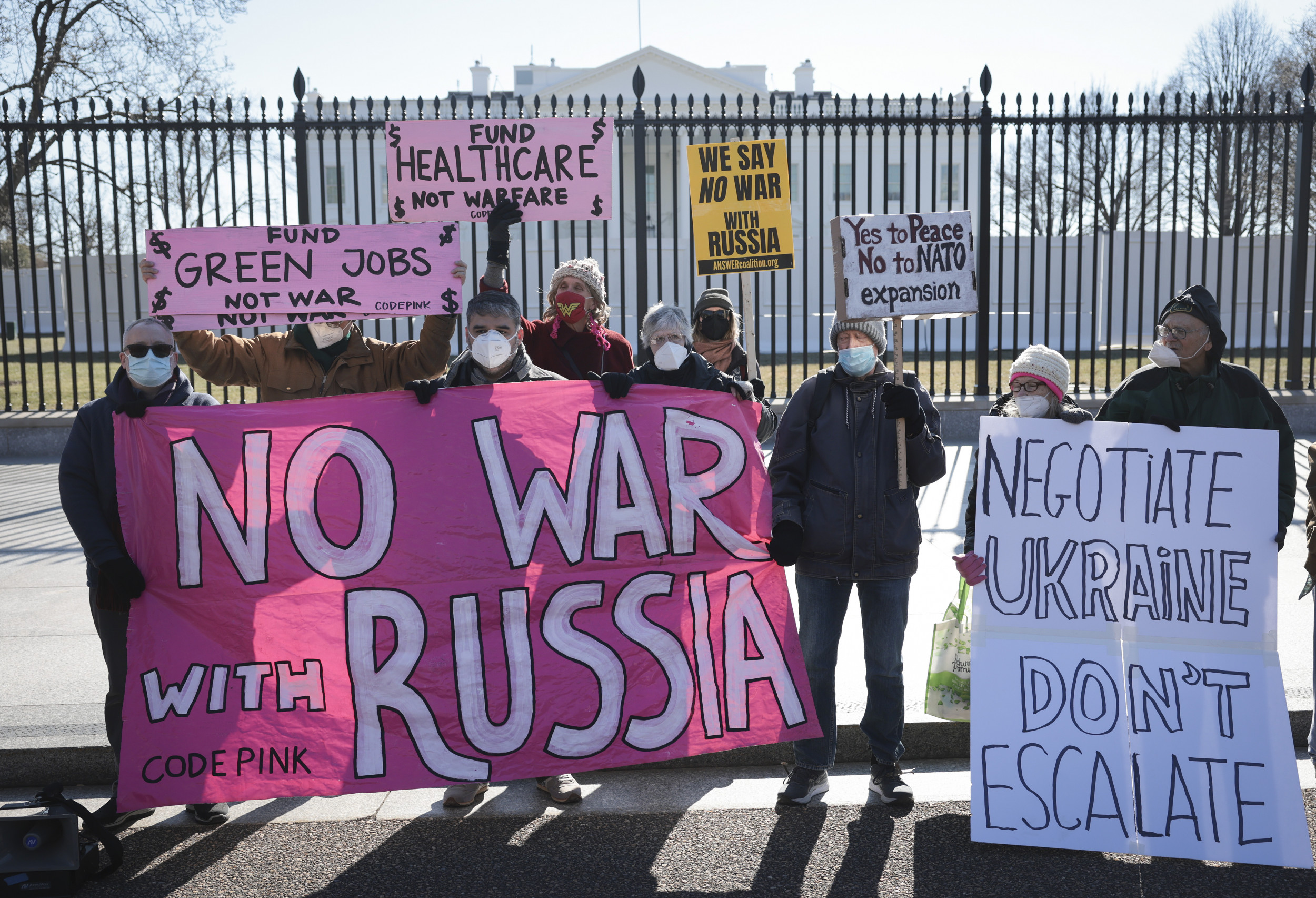
A U.S. instructor trains Ukrainian soldiers for the use of M141 Bunker Defeat Munition missiles at the Yavoriv military training ground, close to Lviv, western Ukraine, January 30, 2022. /VCG
A U.S. instructor trains Ukrainian soldiers for the use of M141 Bunker Defeat Munition missiles at the Yavoriv military training ground, close to Lviv, western Ukraine, January 30, 2022. /VCG
Editor's note: Hamzah Rifaat Hussain is a TV anchor at Indus News in Pakistan. He is also a former visiting fellow at the Stimson Center in Washington and former assistant researcher at the Islamabad Policy Research Institute. The article reflects the author's opinions and not necessarily those of CGTN.
American President Joe Biden's Ukraine diplomacy, characterized by bluster, has punctured any prospect for a breakthrough. While the international community looks for a swift resolution of this lingering crisis, Washington's tactics seem aimed at escalating the crisis.
The White House has imposed sanctions targeting Russian President Vladimir Putin's administration as well as the Russian economy. They include sanctions on Russian banks and energy organizations. American administrative officials say the sanctions were discussed with U.S. allies.
The problem, however, squarely lies in the two pronged approaches adopted by the Biden administration with regard to penalizing Russia as a foreign policy prerogative, which pushes the quagmire into dangerous terrain. The international community cannot afford such blunders.
The United States is already suffering from a credibility crisis on Ukraine. Not all of its allies agree with the tactics being pursued by the Biden administration. On arms supplies, German Defense Minister Christine Lambrecht considered arming Ukraine to be an escalatory tactic which will not diffuse the crisis. The latest sanctions imposed on Russia dents American credibility further where it becomes completely obvious that the entire U.S. approach toward handling the Ukraine crisis is based on geopolitical power play instead of principles of conflict resolution.

Anti-war protesters gather in front of the White House to demonstrate against escalating tensions between the United States and Russia over a potential Russian invasion of Ukraine, in Washington, D.C., U.S., January 27, 2022. /Getty
Anti-war protesters gather in front of the White House to demonstrate against escalating tensions between the United States and Russia over a potential Russian invasion of Ukraine, in Washington, D.C., U.S., January 27, 2022. /Getty
The U.S. is not alone in this regard. The United Kingdom has decided to be in lockstep with the U.S., by introducing legislation which targets corporations doing business with Russia. British Foreign Minister Liz Truss said that any company doing business with the Russian government would be targeted, which includes engaging in commercial activity of both economic and strategic significance.
Yet this policy of economic strangulation pursued by Washington and London, which coincides with diplomatic blusters, will not address lingering sentiments on Russian proposals, but conversely strengthen Moscow's narrative of the West conspiring and drawing up blueprints, which is disruptive to peace in Eastern Europe. The list of 114 senior political figures and 96 oligarchs with close ties to the Kremlin, were previously sent to the U.S. Congress by the Treasury Department in 2018 and the fact that the Biden administration has persisted with penalizing Russia in the year 2022 underlines a flawed strategy of coercion or encirclement which will widen trust deficits even further. This deals a major blow to diplomatic efforts.
What such policies would do, however, is to embolden Moscow further, which has continuously and squarely equated such measures as provocations. By targeting the Russian economy, such policies fit into broader American geopolitical designs of coercive power, rather than sincere efforts in bringing the other party to the negotiating table.
The truth is that attempts at diplomatic isolation in multilateral settings are being complemented by what Republican Senator James Risch and the Senate Panel's Democratic chair Bob Menendez have been drafting prior to the UN Security Council session. This fits into Washington's historical strategy of preparing blueprints as a preemptive measure to be operationalized if tensions escalate with other sovereign states with harmful sanctions.
The fallout of these strategies is a more aggressive response from Russia as Menendez labels the sanctions as attempts of crushing the Russian economy and crippling its oil production, the latter of which continues to be a lifeline for millions of Russian citizens. For a country such as the U.S., which champions the rights of economic freedom across the world, such policies are both ironic and debilitating.
Now with sanctions in place, the Biden administration's international credibility continues to be questionable on Ukraine with repeated foreign policy blunders. Even Ukrainian President Volodymyr Zelensky, after a phone call with Biden, expressed concern that growing rhetoric over the crisis was causing panic and destabilizing Ukraine's economy. The convoluted and knee jerk reaction from the U.S. has once again contributed to greater animosity with no resolution of the Ukraine crisis in sight.
(If you want to contribute and have specific expertise, please contact us at opinions@cgtn.com.)

